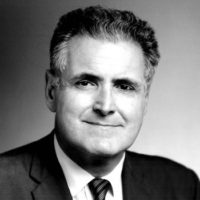
George C. Cotzias
Brookhaven National Laboratory
For the demonstration of the effectiveness of L-DOPA in the treatment of Parkinson’s disease.
Parkinson’s disease, often called “shaking palsy,” is a disease that, in this country alone, claims 1.5 million victims.
The remarkable contribution of Dr. Cotzias and his colleagues is the dramatic demonstration that large, daily dosages of L-DOPA can reverse most of the crippling effects of Parkinsonism. In an editorial in the New England Journal of Medicine, their work is called “the most important contribution to medical therapy of neurological disease in the past 50 years.”
The significance and implications of this work are enormous. The basic research that led to Dr. Cotzias’s method of treatment with Parkinsonism with L-DOPA has opened the way to the treatment of other neurological diseases and has created the need for new neurochemical concepts.
Dr. Cotzias’ contributions are the product of imaginative hypotheses, perceptive analytical thinking, laboratory experimentation, and careful clinical investigation. They have clearly projected the future role of neurochemistry in the treatment of neurological diseases.
To Dr. Cotzias, a brilliant scientist deeply dedicated to the conviction that through basic medical research and its application to clinical research, the human suffering of crippling disease can be eliminated, this 1969 Albert Lasker Clinical Medical Research Award is given.
George C. Cotzias
Acceptance Remarks, 1969 Lasker Awards Ceremony
Mrs. Lasker, Dr. DeBakey, Dr. Van Slyke, Ladies and Gentlemen.
These most distinguished annual gatherings have evolved the custom of giving thanks where thanks are due and of outlining some of the prospects in one's field.
I may well be speaking for the entire biomedical field in thanking Mary Lasker for bestowing upon us her ingenuity, her incredible energy, her elegance, and the legend by which she is surrounded. We are very grateful that she is supporting health instead of some other human need.
It is a privilege to recognize the cardinal contributions of my colleagues, particularly Paul Papavasiliou and Ismael Mena at Brookhaven and Santiago respectively. I still marvel at the enthusiastic support of the Atomic Energy Commission, which is admittedly a most improbable sponsor for our current work.
Finally, I would like to stress that our first paper on the effects of DOPA was rejected as unbelievable by prestigious journals. My father taught me that when one does not get what one wants, one must try for something better. Therefore we tried the New England Journal of Medicine. Dr. Franz Ingelfinger's well-known generosity led him to give the benefit of the doubt to DOPA and to ourselves. He may well have regretted this act of generosity because he has had to translate personally our papers into English from the original Greek.
The most important immediate prospect in our field is that distinguished scientists from many disciplines may now join as equal partners in the struggle against deterioration of the human brain. Working at Brookhaven and at Mount Sinai, we will capitalize on the great scientific potential of both institutions. We will continue addressing ourselves to factors which limit our therapeutic potential. For this purpose it has often been necessary for us to conduct rigorous basic studies on animals, their tissues and their cells. Currently we are studying the cellular interactions between DOPA, or its metabolites and trace metals like manganese. As Dr. Papavasiliou and I have shown, these entities are metabolically connected by the intracellular messenger, cyclic AMP. We are exploring the therapeutic implications of this complex interaction. As we have reported at the recent World Congress of the Neurological Sciences, we have evolved some leads for the synthesis of a new generation of drugs with which to study and treat degenerative diseases of the brain. These activities will keep us busy until Dr. Merrifield or Dr. Nirenberg provide us with the capability to impose permanent instead of temporary changes on the brain.
Thank you very much.
